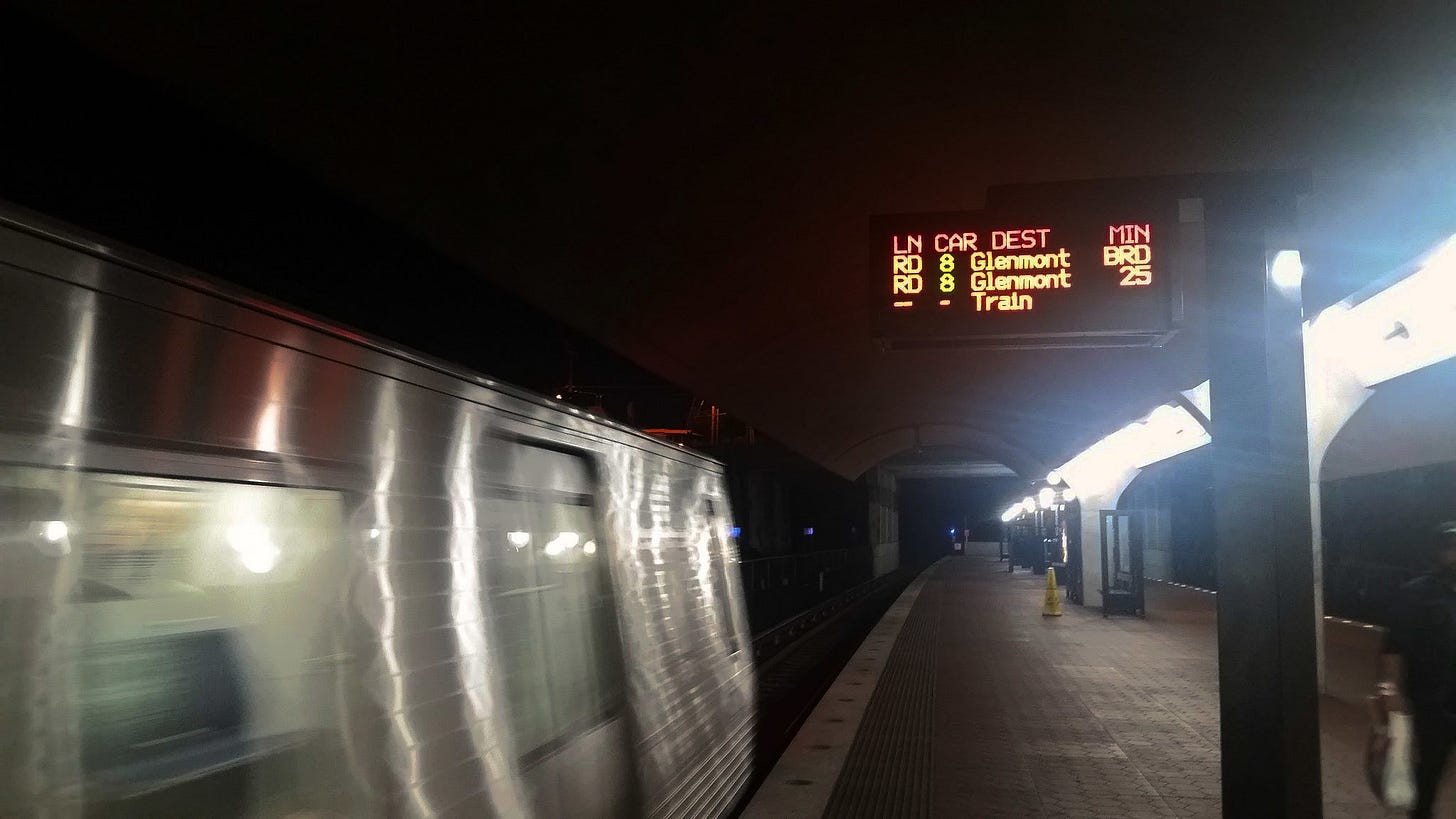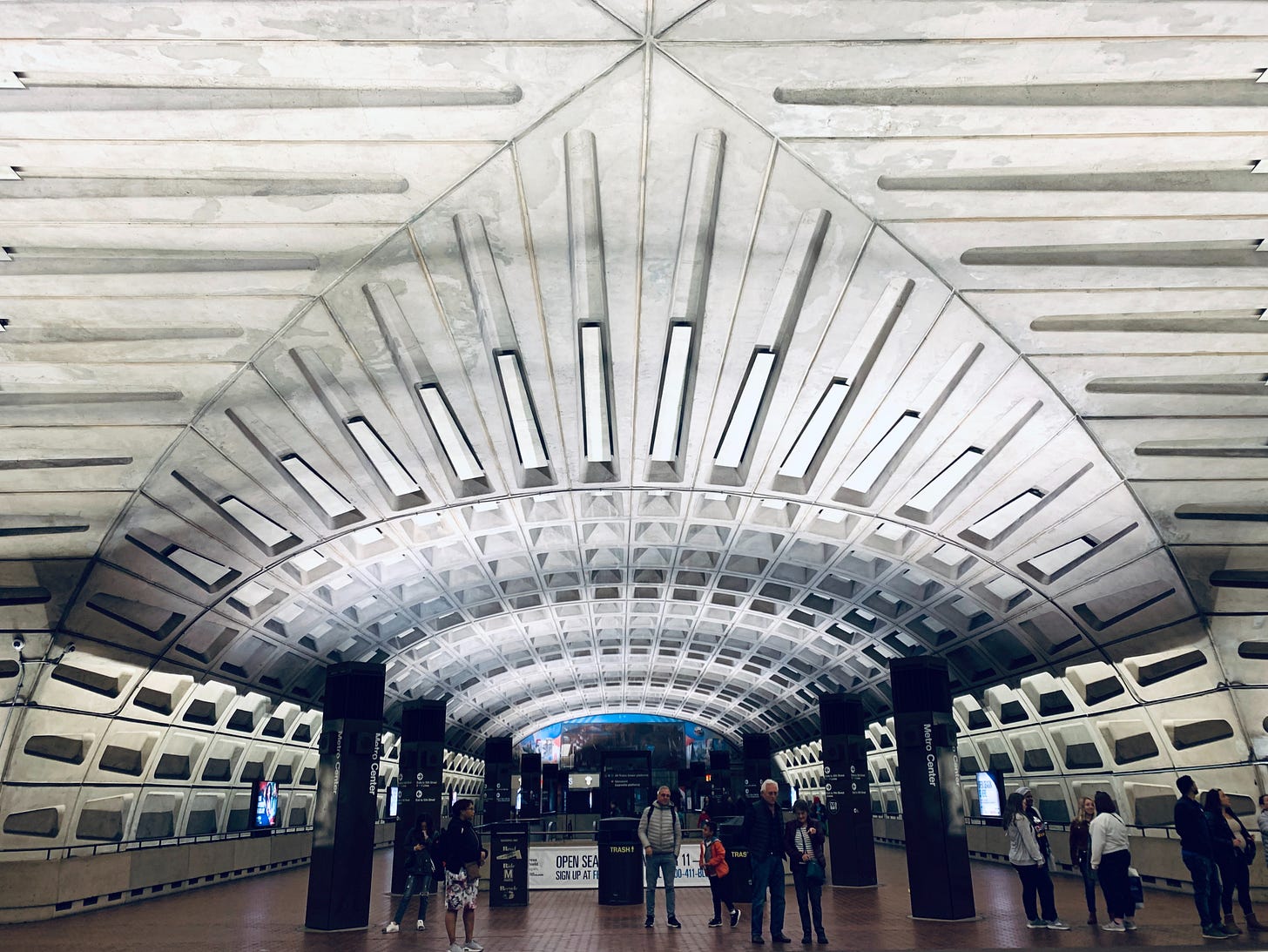MetroNow Dispatch 5.2022
In this month’s issue we attempt to dissect and diagnose the burning question, “how do we finally create a culture of safety at WMATA that is also more accountable and transparent?"
With Great Power Comes Great Responsibility

Where should we begin?
This past month brought a slew of WMATA headlines, from the new incoming general manager, Randy Clarke, to GM/CEO Wiedefeld’s early departure, the lapsed recertification of half of the system rail operators, a report that WMATA has a “Culture That Accepts Noncompliance”, and a plan to restore a limited number of 7000-series railcars, to name a few.
While we are optimistic about the change in leadership, including interim CEO Andy Off, to help course correct one of the region’s most important institutions, WMATA has not yet shown the consistent, demonstrable progress towards improving safety, accountability, and transparency that the region deserves from its sizable investments.
To better understand where we are today and where we need to go, let’s take a brief look back at where we’ve been.
WMATA: The Briefest History of the Authority

“The Washington Metropolitan Area Transit Authority (Metro) was created by an interstate compact in 1967 to plan, develop, build, finance, and operate a balanced regional transportation system in the national capital area. Metro began building its rail system in 1969, acquired four regional bus systems in 1973, and began operating the first phase of Metrorail in 1976.”
When WMATA began building the Metro system in 1969, just under three million people lived in the Washington Metropolitan Area. Today, more than six million people call this region home. WMATA has shaped the region as we more than doubled in size and connected our economy as it grew into one of the largest in the U.S.
The original compact, which created the structure of the board and officers, the financing of the transit system, and all of WMATA’s rights and responsibilities has only been amended a handful of times in the past 50+ years. While the compact does outline minimum requirements concerning annual independent audits, reports, and establishes an Inspector General, the ideas of safety, accountability, and transparency are not a central focus of the authorizing compact. Instead, those values rely on the Board, WMATA leadership, and staff to ensure.
The Bad Years

Forty years after WMATA began building the Metrorail system, a tragic failure of the automated systems on the Red Line killed nine people. In the ensuing decade, the middle-aged system was showing wear and tear, with increasing safety and reliability issues depressing ridership and ultimately leading to the Federal Transit Administration (FTA) placing WMATA under direct federal supervision in 2015 after the Yellow Line smoke and electrical arcing accident that killed one passenger and injured dozens of others, during which time FTA staff called the system a “dumpster fire” after electrical issues surfaced.
Decades of deferred maintenance, exacerbated by a lack of adequate capital funding, was identified as a principal threat to the safety and welfare of transit riders. The WMATA Board and new leader, former GM/CEO Wiedefeld, instituted SafeTrack, an accelerated work plan, to “complete approximately three years' worth of work into approximately one year,” which evolved into the Back2Good promise to make real improvements to the WMATA system and the agency’s safety record that riders could see and feel.
The Hunt for Dedicated (Capital) Funding

Safety was the forcing issue for action in the 2018 MetroNow campaign, which successfully secured $500M in annual dedicated capital funding from the three states, on top of $300M in PRIIA funding ($150M from the federal government and $150M local match), to address what at the time was a $12B backlog of deferred maintenance. While we envisioned funding reform occuring alongside governance and accountability reforms, when the funding deal was ultimately struck, the governance and accountability reforms, “fell short of expectations,” due to a lack of regional consensus and concerns about the length of time that would be needed to amend the compact (see above for more about the compact).
Since securing dedicated capital funding in 2018, WMATA has been able to make significant progress on delivering safer, more reliable, affordable service. However, crises like the ongoing removal of the 7000-series railcars from service and the astonishing lapse in recertification for half of WMATA’s rail operators is a reminder that funding alone will not, and cannot solve all of WMATA’s safety, accountability, and transparency issues.
Where do we go from here?
The MetroNow Coalition knows that our region cannot focus only on funding as the antidote for WMATA’s woes. More money doesn’t guarantee safe, reliable, all day service until and unless WMATA is able to address the root causes that allow safety concerns to be ignored and metastasize until they rupture into crises.
As we expressed in the statement released by MetroNow on May 17, we urge the incoming GM/CEO Randy Clarke and the Interim GM/CEO Andy Off to conduct, “a top to bottom review of operations and management at WMATA, and to identify sweeping changes to correct for the factors which are impeding the development of a comprehensive culture of safety.” We have also urged the WMATA Board to, “to make it a priority to track and report progress on fixing safety, operations, and maintenance.” At the same time, none of us can be lulled into thinking that this problem is solved. A new GM/CEO is simply unable to solve these long-standing issues alone.
MetroNow remains committed to ensuring WMATA’s long-term success and securing sustainable funding which will require significant safety and accountability reforms. As we approach the coming fiscal operating cliff on July 1, 2023, the region’s leaders, including the WMATA Board and WMATA leadership, need to take a hard look at what reforms are needed around safety, accountability, and transparency, to make sure the region’s continued fiscal support for WMATA, from capital to operating dollars, is actively improving the safety and reliability of the region’s transit system.
Transit Champion of the Month: Washington Metrorail Safety Commission
The Washington Metrorail Safety Commission (WMSC) is an independent entity with oversight and enforcement authority to ensure continual safety improvements in WMATA’s Metrorail system. The commission was created through an interstate compact between Maryland, DC, and Virginia signed in 2017 and stood up in March 2019 when it assumed direct oversight responsibility for Metrorail. Since then, and in the absence of a proactive and transparent culture of safety and accountability at WMATA, WMSC has uncovered safety concerns through its auditing and reporting and forced WMATA to take corrective action. We thank WMSC, the members of the commission, and its staff for their service to the region.
Subscribe + Share!
Sharing is caring! Share the MetroNow Dispatch with any friends, colleagues, or family members who want to join us for the ride!
Follow @MetroNow on Twitter for daily tidbits of transit gold.
Reach out to us directly with any feedback, hot takes, or ideas for future newsletter topics: info@metronow.com
The MetroNow Coalition is made up of regional leaders from the business, non-profit, and advocacy communities who believe that transit is designed to bring us together —at work, school, and play. Today, we believe our collective advocacy for better transit for the Washington DC region is more important than ever.
We launched the MetroNow Dispatch to bring residents, leaders, and transit agencies together to think about how we can make better transit today, during the pandemic, and “tomorrow,” as we look beyond recovery to how we can build a more equitable, sustainable, and accessible transportation system for our region.





